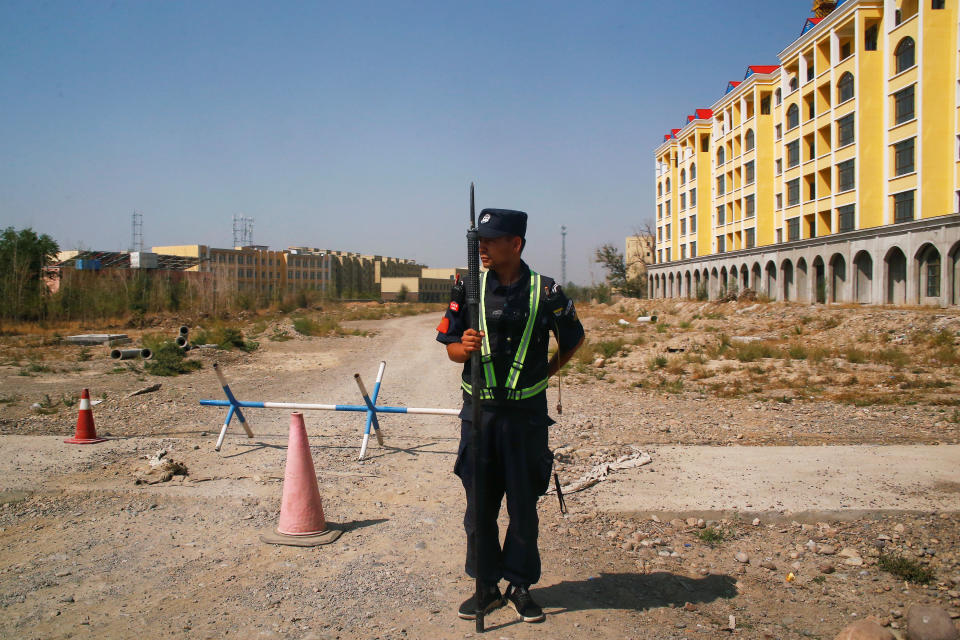Chinese satellite images reveal country's horrific secret
Scrutiny over China’s controversial and heavily-criticised detention camps continues to mount as one of Australia’s leading think tanks claimed Beijing had ramped up construction of facilities that house more than one million imprisoned Uyghurs over the last year.
The Australian Strategic Policy Institute (ASPI) said it had identified more than 380 "suspected detention facilities" in Xinjiang province, where China is believed to have held more than one million Uyghurs and other mostly Muslim Turkic-speaking residents.
The number of facilities is around 40 per cent greater than previous estimates, the research said, and has been growing despite China's claims that many Uyghurs have been released.
Based on satellite imagery, eyewitness accounts, media reports and official construction tender documents, the institute said "at least 61 detention sites have seen new construction and expansion work between July 2019 and July 2020".
One satellite image included in the ASPI report from January shows a brand new facility near the city of Kashgar. Earlier satellite images show the site was previously barren landscape.

China is still building detention camps in Xinjiang — and they're getting even bigger. - New @ASPI_org report https://t.co/ZVak5xEFjX
The evidence of China's extensive system of repression in Xinjiang is overwhelming. Beijing's denials fool no one. https://t.co/o1gJW7MO8p pic.twitter.com/EyaElsASi2— Andrew Stroehlein (@astroehlein) September 24, 2020
Around half of the new centres are higher security facilities, which report author Nathan Ruser believes could move towards prison-style facilities.
"The findings of this research contradict Chinese officials' claims that all 'trainees' from so-called vocational training centres had 'graduated' by late 2019," he said.
"Instead, available evidence suggests that many extrajudicial detainees in Xinjiang's vast "re-education" network are now being formally charged and locked up in higher security facilities, including newly built or expanded prisons, or sent to walled factory compounds for coerced labour assignments."
China continues to face widespread condemnation for the camps, which in recent months have been propelled into the media spotlight.
Allegations of mental and physical torture in the facilities are rife, with inhabitants forced to learn Mandarin and criticise and renounce their faith.

Beijing stresses the camps are for “vocational training” purposes and primarily tackle poverty in the once autonomous region.
China’s control over the region has tightened in the past two decades, and in recent years has reached new levels with President Xi Jinping desperate to come down hard on “violent terrorism”.
Uyghur Mirehmet Ablet told Yahoo News Australia earlier this year the 9/11 terrorist attacks prompted the Chinese government’s meticulous control over the region’s 10 million Uyghurs.
More recent terrorism incidents, including the 2014 Kunming massacre which saw 31 civilians killed in a knife attack at a train station in China’s southwest, have only prompted further action in Xinjiang after links to separatists.

China slams ‘ludicrous findings’
On Thursday, China denied ASPI’s findings, and once again lashed out at ASPI for its “fat-distorting reports” and “passion lies”.
“Imbued with ideological prejudice, it is practically an anti-China "vanguard" whose academic integrity is in serious question,” Foreign Ministry spokesperson Wang Wenbin said.
“The ASPI has come under wide criticism for what it has done and stands as a laughing stock in the world. We hope and trust that people will all see through and reject the ludicrous findings of such anti-China organisations.”
Beijing recently published a white paper defending its policies in Xinjiang, where it says training programmes, work schemes and better education mean life has improved.
It claims to have given "training sessions" to an average of 1.29 million workers each year between 2014 and 2019.
Following the publication of the ASPI report, the Chinese government-controlled nationalist tabloid Global Times cited "sources" as saying contributors Clive Hamilton and Alex Joske were banned from entering China.
Wang did not confirm if the two academics had been banned on Thursday, but said the matter was "totally within the scope of China's sovereignty".
with AFP
Do you have a story tip? Email: newsroomau@yahoonews.com.
You can also follow us on Facebook, Instagram and Twitter and download the Yahoo News app from the App Store or Google Play.




